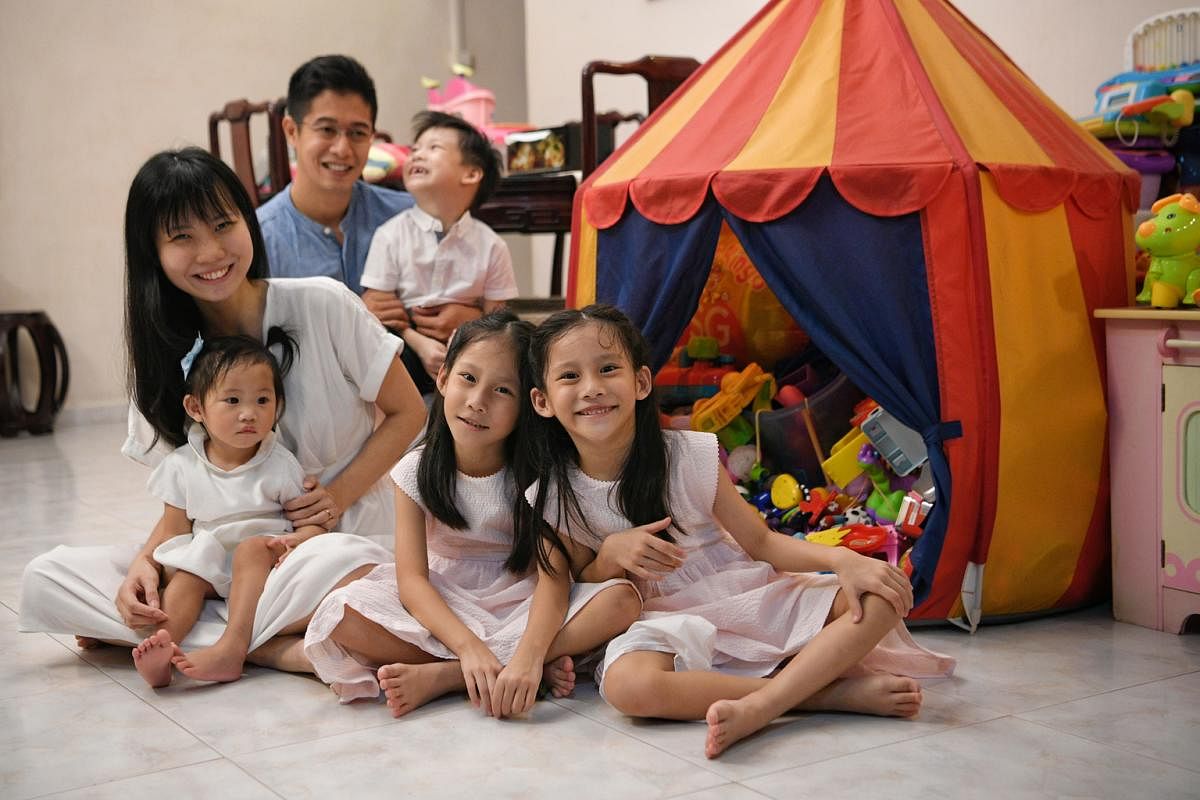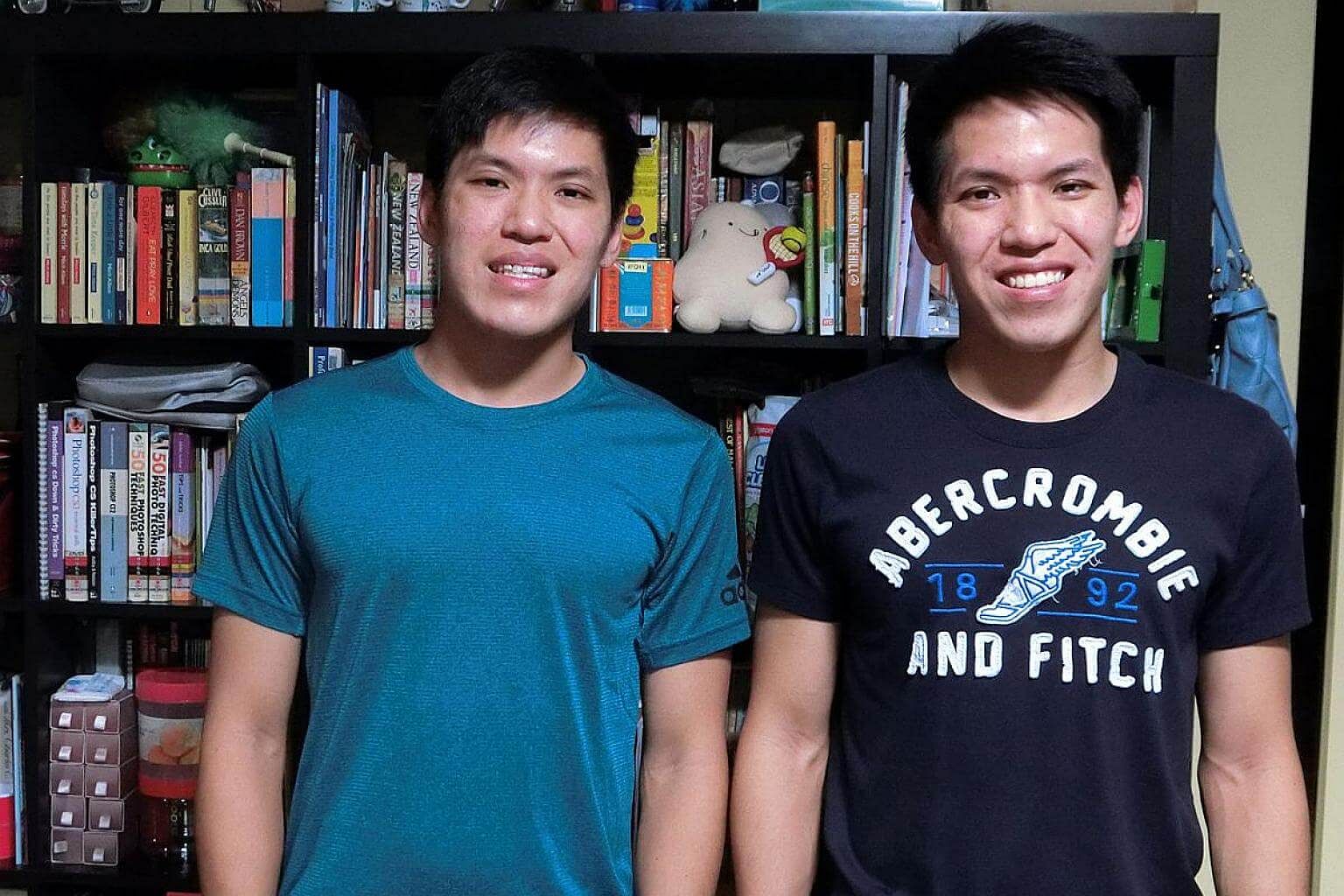Raising twins as individuals
Having twins can mean two times the joy for parents, but twins can also present practical problems, such as their overly close ties with each other

They look similar. One may be outgoing and the other is shy. Some develop a secret language. Others dress alike till they are old.
Twins and their bonds have fascinated scientists for years. While the more extreme examples of twin behaviour may be what captures the popular imagination, experts say the often intense bond between twins can sometimes present more prosaic problems - such as how to make friends with others.
For this reason, HR manager Joey Chia, 42, hoped that her twin daughters would be placed in different classes in Primary One.
"We felt it was good for them to be more independent and learn to socialise on their own, so they can learn how to get close to other friends in the absence of their twin sister," she says.
Her husband is Mr Vincent Chia, 44, a traditional Chinese medicine physician.
Their twins, Vernice and Joelle, who are now 12 years old, have always been close.

From the time they were in kindergarten, they enjoyed drawing and making picture books together and attended enrichment classes as a pair.
Although they are non-identical twins, they look similar to each other.
The parents eventually left it to the girls' primary school to decide where to place them and they ended up in the same class in the first two years.
In Primary 3 and 4, the girls were in different classes and their social circles widened.
Today, Vernice and Joelle, who ended up in the same class again in the last two years of primary school, say they have no problems making friends on their own.
"It's easier to have a twin in school because she helps me record the homework we have to do," says Vernice, the elder twin by five minutes.
In the 10 years between 2004 and 2014, the number of women giving birth to twins in Singapore surged almost 50 per cent.
In 2004, 385 mothers had twins, compared to 573 mothers having twins in 2014, a rise attributed by doctors at the time to the increased use of in-vitro fertilisation (IVF) and other Assisted Reproductive Technology treatments, which have a higher rate of multiple births compared to parents who conceive naturally.
Although some parents of twins or triplets seldom urge their multiples to socialise more with others, experts say that doing so from a young age can help the children build a stable self-identity.
Although the research on twins globally is limited, it indicates that co-dependency, where one person depends excessively on another for his identity, poses a challenge for twins, says Mr Praveen Nair, director, psychologist and senior consultant at Raven Counselling and Consultancy.
This is particularly so for identical twins in general.
"Most of the studies show that identical twins have a stronger bond compared to non-identical or fraternal twins, maybe because they share the same genetic makeup, coming from the same egg," says Ms Frances Yeo, a registered psychologist at Thomson Paediatric Centre.
Mr Nair adds: "If twins are viewed as one entity, especially if they look the same, it would facilitate co-dependency."
"Being in a small country and Asian society makes things more complicated. They can't go to a different state to work, for instance, and Asian societies in general view collectivism a bit more favourably compared to individualism."
Parents can help twins socialise more and start building a psycholgically healthy self-identity from a young age, experts say.
Mr Nair says parents should consider not dressing twins alike from a young age as this "reinforces the notion that they are one unit", as does calling their offspring "the twins" instead of calling them by their names.
Mr Jony Khoe, the father of adult twin sons, did not worry about such considerations. He values the fact that his children were in the same class from kindergarten to Secondary 4.
"They could take care of and help each other. For instance, they would come to us for help in their homework only when both of them couldn't do it," recalls Mr Khoe, who is in his early 50s and works as a technical director in the IT industry. His wife works as administrative support in the IT industry.
He says that his sons, who are now 24, were sociable youngsters who usually had their own best friends outside the family.
Asserting their individual identities was a natural process that occurred in their teens.
"When they were younger, if one had a red T-shirt, the other wanted one too as he did not want to feel short-changed.
"But in their upper secondary school days, the opposite happened. They tried to be different from each other and opted for different colours and styles of clothing," he says.
Another way that parents can support their twin children is by not comparing them and focusing on helping them embrace their unique personality traits, says Ms Sarah Chua, a parenting specialist at Focus On The Family Singapore.
Housewife Delphine Ho Soo Fang, 35, feels that her fraternal twins, a girl and a boy, benefit from looking different.
"They have a companion in each other. Although they don't take the first step to make friends, they tend to get approached by other children to make friends," she says. Her husband is a 42-year-old supply chain manager in the IT industry.
Their twins are seven-year-old Hannah and Nicholas Eng and they have a younger daughter, Kayla, aged four.
While she also ensures her twins socialise with others through play dates and church groups, she is also mindful to cultivate their individual identities.
She says: "On their birthdays, they will each have a separate birthday song and sometimes, each has a birthday cake. They deserve to have that individual attention."
Twins so close, they excluded brother
Firstborn twins Keira and Kayla Chia are so close that they did not seem to want other children in their family circle, rejecting their younger brother when he was born.
This prompted their parents to have a fourth child to prevent their son from being lonely and sidelined.
The plus side of being twins is that Keira and Kayla, age five, are each other's staunch defender and advocate.
Once, when Kayla accidentally spilled a bowl of rice in school, her schoolmates laughed at her. Keira spoke up for her, telling them not to laugh at her twin and helping Kayla clear things up.
Their father, Mr Nicholas Chia, 31, says: "They stick up for each other and stick together as well."
The downside of having such a tight relationship was that when their four-year-old brother Keyan was born, Kayla and Keira, who were 18 months old then, refused to be in the same room as the newborn, possibly in part because of jealousy over a new arrival.
After that, they refused to play with their brother for months despite their parents' continual encouragement.
Mr Chia, who works in the automobile industry, and his wife, stayat- home mum Ashley Hong, 27, were both already open to having more children.
Their twins' rejection of their younger son prompted them to try conceiving another child.
When youngest daughter Kara, now 20 months old, was born, her brother was frequently at her bedside.
Now, they often play together.
The twins are also more accepting of Keyan and the siblings' dynamics "evened out" when Kara was born, says Ms Hong.
Keyan, she adds, has become more social and confident, and has opened up more.
Catching up on socialising at work

Although identical twins Joseph and Christopher Gan, 25, have always been in different classes and, sometimes, in different schools, the bond they share meant they were not curious about making new, close friends - until now.
In July, they landed their first jobs after graduating from different local universities and this made them more aware that they need to brush up on their socialisation skills.
They have two older brothers.
Christopher, an engineer in the aviation industry, says they have a comfort zone as twins, even though they have always had their own friends.
He and his twin brother shared a room while growing up and had similar interests such as running and cycling.
Joseph, who works as a planning analyst in the online retail industry, says: "We always had each other to confide in. I didn't feel the need to have really close friends."
"At work, however, sometimes you have to make the extra effort to communicate more."
Christopher says he felt the need to network with his colleagues when he entered the workforce.
He says: "Being introverted, this was challenging at the start, but it was made easier due to company events that I try and participate in."
Joseph, who started making a conscious effort to hang out more with friends and colleagues in his university days, adds: "Even though being a twin might have slightly delayed the process of learning to socialise, I believe that I will catch up soon."
How to give twins their own identity
Mr Praveen Nair, director, psychologist and senior consultant at Raven Counselling and Consultancy, provides some tips on how to help twins socialise and build a strong self-identity.
1 Parents should try to allocate regular one-on-one time for each twin where they can talk to him to identify and address potential social issues each may face. The key is to make each twin feel like an individual to reduce the potential for co-dependency, which is an excessive dependency on another person for one's identity.
2 Start as young as possible in trying not to dress them in similar clothes, which can deprive them of a sense of identity. Research shows this increases the risk of isolation from peers.
3 Parents could provide each twin with his own toys, bed and space. This helps the children develop a concept of having their own belongings. This in turn will help them develop a separate social life, as each twin may understand that he is a unique individual who need not always take part in the same events or join the same groups as his twin.
4 Parents should nurture and encourage differences such as one twin being more athletic, while the other prefers reading. This may assist in the development of a healthy identity which is helpful for socialisation. As a general rule, parents should encourage in their children varied interests, curiosity, independence and creativity.
Join ST's Telegram channel and get the latest breaking news delivered to you.
A version of this article appeared in the print edition of The Sunday Times on November 26, 2017, with the headline Raising twins as individuals. Subscribe

